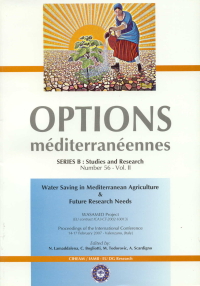| Article précédent | p. 115-128 | Article suivant |
Treated wastewater sources: actions towards sustainable and safely use in the Near East and achieving food security in water-scarce poor rural communities
In small communities, the quality of the effluent from wastewater treatments plants (WWTP) is limited by the low feasibility of investment in construction of small-scale WWT facilities and in their operation. Using the treated effluent for irrigation purposes adds an economical driving force for investments in WWT. Another economic advantage of choosing agricultural irrigation, as a final disposal solution for the treated effluent is that it permits low quality demands, especially in regards to nutrients removal. Final disposal by irrigation is usually combined with non-compromising hygienic demands. Controlled utilization of the treated effluent reduces the environmental risks of polluting lakes, rivers and/or other land and water resources, which might be caused by other alternatives of effluent disposal. Governments in Near East and North Africa countries (NENA) should assess the reuse of treated wastewater with an integrated approach taking into account not only the monetary cost and benefits in terms of ecological, social and economic concerns, but more to consider a systemic perspective of the sustainability impacts. Moreover such a systemic perspective should be developed in a participatory process with a specific focus on the local or regional conditions. Furthermore the acceptance for the reuse and the costs of treating the wastewater and transporting it to reuse location should be taken into account and handled appropriately.
- [ Afficher ]
- [ Télécharger ]
- [ Exporter la citation ]
Vous pouvez télécharger la citation au format :
- [ Imprimer ]
-
Mots-clés
AFRIQUE DU NORD, ANALYSE DE SYSTEME, DURABILITE, EAU USEE, MOYEN ORIENT, PARTICIPATION, REUTILISATION DES EAUX, TRAITEMENT DES EAUX USEES, ZONE RURALECiter cet article
Choukr-Allah R. Treated wastewater sources: actions towards sustainable and safely use in the Near East and achieving food security in water-scarce poor rural communities. In : Lamaddalena N. (ed.), Bogliotti C. (ed.), Todorovic M. (ed.), Scardigno A. (ed.). Water saving in Mediterranean agriculture and future research needs [Vol. 2]. Bari : CIHEAM, 2007. p. 115-128. (Options Méditerranéennes : Série B. Etudes et Recherches; n. 56 Vol.II). Proceedings of the International Conference WASAMED Project (EU contract ICA3-CT-2002-10013), 2007/02/14-17, Valenzano (Italy). http://om.ciheam.org/om/pdf/b56_2/00800182.pdf



